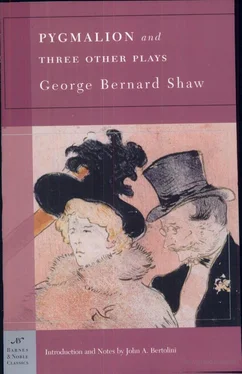As Mr. Stuart-Glennie traced the evolution of society to the conflict of races, his theory made some sensation among Socialists — that is, among the only people who were seriously thinking about historical evolution at all — by its collision with the class-conflict theory of Karl Marx. Nietzsche, as I gather, regarded the slave-morality as having been invented and imposed on the world by slaves making a virtue of necessity and a religion of their servitude. Mr. Stuart-Glennie regards the slave-morality as an invention of the superior white race to subjugate the minds of the inferior races whom they wished to exploit, and who would have destroyed them by force of numbers if their minds had not been subjugated. As this process is in operation still, and can be studied at first hand not only in our Church schools and in the struggle between our modern proprietary classes and the proletariat, but in the part played by Christian missionaries in reconciling the black races of Africa to their subjugation by European Capitalism, we can judge for ourselves whether the initiative came from above or below. My object here is not to argue the historical point, but simply to make our theatre critics ashamed of their habit of treating Britain as an intellectual void, and assuming that every philosophical idea, every historic theory, every criticism of our moral, religious and juridical institutions, must necessarily be either imported from abroad, or else a fantastic sally (in rather questionable taste) totally unrelated to the existing body of thought. I urge them to remember that this body of thought is the slowest of growths and the rarest of blossomings, and that if there is such a thing on the philosophic plane as a matter of course, it is that no individual can make more than a minute contribution to it. In fact, their conception of clever persons parthenogenetically bringing forth complete original cosmogonies by dint of sheer “brilliancy” is part of that ignorant credulity which is the despair of the honest philosopher, and the opportunity of the religious impostor.
THE GOSPEL OF ST. ANDREW UNDERSHAFT
It is this credulity that drives me to help my critics out with Major Barbara by telling them what to say about it. In the millionaire Undershaft I have represented a man who has become intellectually and spiritually as well as practically conscious of the irresistible natural truth which we all abhor and repudiate: to wit, that the greatest of evils and the worst of crimes is poverty, and that our first duty — a duty to which every other consideration should be sacrificed — is not to be poor. “Poor but honest,” “the respectable poor,” and such phrases are as intolerable and as immoral as “drunken but amiable,” “fraudulent but a good after-dinner speaker,” “splendidly criminal,” or the like. Security, the chief pretence of civilization, cannot exist where the worst of dangers, the danger of poverty, hangs over everyone’s head, and where the alleged protection of our persons from violence is only an accidental result of the existence of a police force whose real business is to force the poor man to see his children starve whilst idle people overfeed pet dogs with the money that might feed and clothe them.
It is exceedingly difficult to make people realize that an evil is an evil. For instance, we seize a man and deliberately do him a malicious injury: say, imprison him for years. One would not suppose that it needed any exceptional clearness of wit to recognize in this an act of diabolical cruelty. But in England such a recognition provokes a stare of surprise, followed by an explanation that the outrage is punishment or justice or something else that is all right, or perhaps by a heated attempt to argue that we should all be robbed and murdered in our beds if such senseless villainies as sentences of imprisonment were not committed daily. It is useless to argue that even if this were true, which it is not, the alternative to adding crimes of our own to the crimes from which we suffer is not helpless submission. Chickenpox is an evil; but if I were to declare that we must either submit to it or else repress it sternly by seizing everyone who suffers from it and punishing them by inoculation with smallpox, I should be laughed at; for though nobody could deny that the result would be to prevent chickenpox to some extent by making people avoid it much more carefully, and to effect a further apparent prevention by making them conceal it very anxiously, yet people would have sense enough to see that the deliberate propagation of smallpox was a creation of evil, and must therefore be ruled out in favor of purely humane and hygienic measures. Yet in the precisely parallel case of a man breaking into my house and stealing my wife’s diamonds I am expected as a matter of course to steal ten years of his life, torturing him all the time. If he tries to defeat that monstrous retaliation by shooting me, my survivors hang him. The net result suggested by the police statistics is that we inflict atrocious injuries on the burglars we catch in order to make the rest take effectual precautions against detection; so that instead of saving our wives’ diamonds from burglary we only greatly decrease our chances of ever getting them back, and increase our chances of being shot by the robber if we are unlucky enough to disturb him at his work.
But the thoughtless wickedness with which we scatter sentences of imprisonment, torture in the solitary cell and on the plank bed, and flogging, on moral invalids and energetic rebels, is as nothing compared to the stupid levity with which we tolerate poverty as if it were either a wholesome tonic for lazy people or else a virtue to be embraced as St. Francis embraced it. If a man is indolent, let him be poor. If he is drunken, let him be poor. If he is not a gentleman, let him be poor. If he is addicted to the fine arts or to pure science instead of to trade and finance, let him be poor. If he chooses to spend his urban eighteen shillings a week or his agricultural thirteen shillings a week on his beer and his family instead of saving it up for his old age, let him be poor. Let nothing be done for “the undeserving”: let him be poor. Serve him right! Also — somewhat inconsistently — blessed are the poor!
Now what does this Let Him Be Poor mean? It means let him be weak. Let him be ignorant. Let him become a nucleus of disease. Let him be a standing exhibition and example of ugliness and dirt. Let him have rickety children. Let him be cheap and let him drag his fellows down to his price by selling himself to do their work. Let his habitations turn our cities into poisonous congeries of slums. Let his daughters infect our young men with the diseases of the streets and his sons revenge him by turning the nation’s manhood into scrofula, cowardice, cruelty, hypocrisy, political imbecility, and all the other fruits of oppression and malnutrition. Let the undeserving become still less deserving; and let the deserving lay up for himself, not treasures in heaven, but horrors in hell upon earth. This being so, is it really wise to let him be poor? Would he not do ten times less harm as a prosperous burglar, incendiary, ravisher or murderer, to the utmost limits of humanity’s comparatively negligible impulses in these directions? Suppose we were to abolish all penalties for such activities, and decide that poverty is the one thing we will not tolerate — that every adult with less than, say, £365 a year, shall be painlessly but inexorably killed, and every hungry half naked child forcibly fattened and clothed, would not that be an enormous improvement on our existing system, which has already destroyed so many civilizations, and is visibly destroying ours in the same way?
Is there any radicle of such legislation in our parliamentary system? Well, there are two measures just sprouting in the political soil, which may conceivably grow to something valuable. One is the institution of a Legal Minimum Wage. The other, Old Age Pensions. But there is a better plan than either of these. Some time ago I mentioned the subject of Universal Old Age Pensions to my fellow Socialist Mr. Cobden-Sanderson, famous as an artist craftsman in bookbinding and printing. “Why not Universal Pensions for Life?” said Cobden-Sanderson. In saying this, he solved the industrial problem at a stroke. At present we say callously to each citizen: “If you want money, earn it,” as if his having or not having it were a matter that concerned himself alone. We do not even secure for him the opportunity of earning it: on the contrary, we allow our industry to be organized in open dependence on the maintenance of “a reserve army of unemployed” for the sake of “elasticity.” The sensible course would be Cobden-Sanderson’s: that is, to give every man enough to live well on, so as to guarantee the community against the possibility of a case of the malignant disease of poverty, and then (necessarily) to see that he earned it.
Читать дальше












